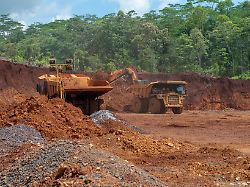Highest nickel production in the world
Courtship for Indonesia’s natural resources begins
By Andrea Sellmann and Mary Abdelaziz-Ditzow
04/13/2023 8:23 am
Indonesia has what Germany needs: large quantities of nickel for the production of batteries. Ambitious plans put the island archipelago on the world economic stage. German companies explore their opportunities – and meet top dog China.
When Indonesia is presenting itself as a partner country at the Hanover Fair these days, it is about business: Indonesian President Joko Widodo leaves no doubt in advance that he has ambitious plans: by 2030, Indonesia wants to be one of the ten largest economies in the world to count. Experts believe that this is feasible, after all, the island state is already the economically strongest country in Southeast Asia.
The Indonesian archipelago is about five times the size of Germany and is therefore one of the major players in the region. Over 275 million people live there. As a trading partner for Germany, the country has so far ranked among the most distant. But since the Ukraine war has brought Germany’s dependence on China into focus, its strategic importance has increased. “Indonesia has a variety of raw materials,” explains Jan Rönnfeld in the ntv podcast “Wirtschaft Welt & Weit”. The general manager of the German-Indonesian Chamber of Commerce in Jakarta knows the situation there very well: The island of Sulawesi, for example, is rich in nickel, an important component for batteries in electric cars.
Last year, 1.6 million tons of nickel were mined in Indonesian mines – almost half of the world’s production. With 21 million tons, the reserves are as large as anywhere else in Australia. On the way to e-mobility, German car manufacturers find it difficult to avoid Indonesia.
Germany is late
But they are running late, says Frank Malerius of Germany Trade & Invest, the federal foreign trade agency: “The value chain from nickel mining to processing is already largely in Chinese hands.” According to Malerius, the Chinese are coming with a large suitcase of money and have to be less considerate in the industry. Western standards focus on people and the environment, but they take time.
European companies urgently need to position themselves in order to get involved at all, says Rönnfeld. He therefore calls for clear investment commitments, as the chemical group BASF and the French mining company Eramet are showing: The companies are currently examining cooperation on a nickel-cobalt plant for the electric car market. In this way, BASF could gain access to 42,000 tons of nickel and 5,000 tons of cobalt from mines that meet international sustainability standards.
Nevertheless, Europe will hardly be able to catch up with China. Indonesia is also sticking to its rules: instead of simply exporting raw materials, they should be processed in the country itself so that local people can benefit from more added value. Western investors are welcome on this path and certainly courted. Indonesia has relaxed its investment and labor laws specifically for this purpose and is driving digitization forward. Head of state Joko Widodo will campaign aggressively for his country at the Hanover Fair.
What does Germany have to do in order to still play an important role in the economic world of tomorrow? Who are we dependent on? Which countries benefit from the new world situation? Mary Abdelaziz-Ditzow discusses this in the ntv podcast “Wirtschaft Welt & Weit” with relevant experts.
You can find all episodes in the ntv app or wherever there are podcasts: at RTL+ music, Apple Podcasts, Google Podcasts, Spotify, Amazon Music or deezer. For all other podcast apps, you can use the RSS feed.
